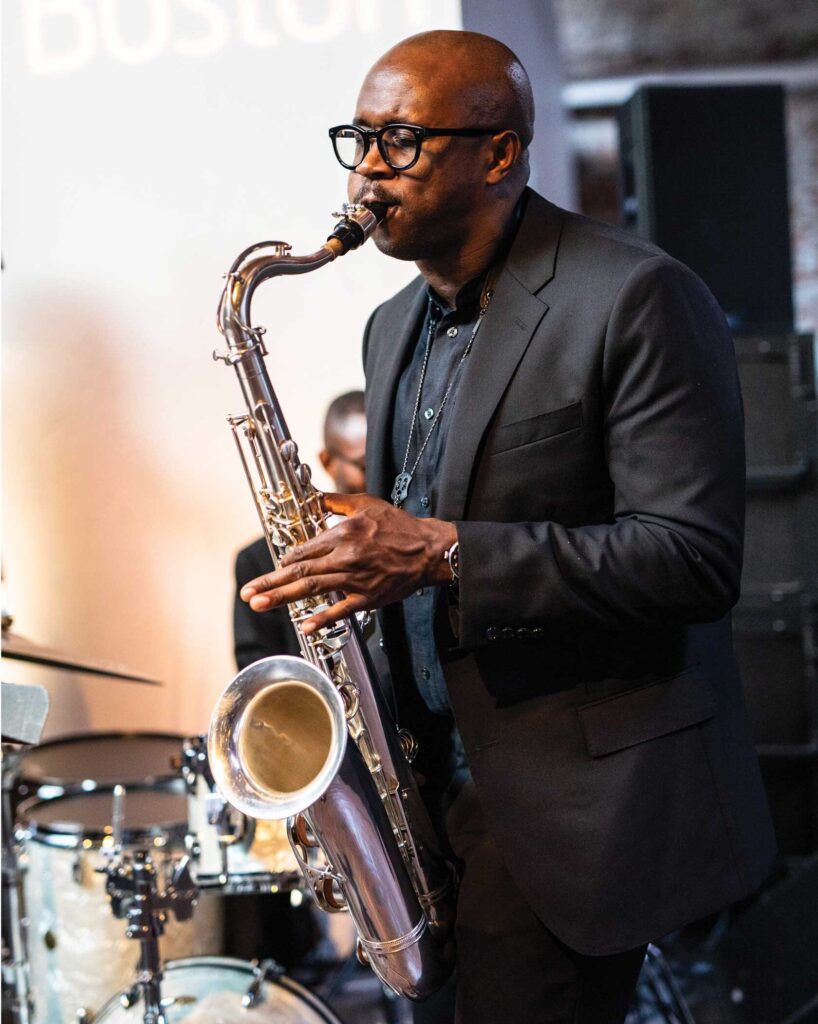
Gregory Groover Jr. and his quartet will perform songs from his two albums, “Negro Spiritual Songbook, Vol. 1” and “Negro Spiritual Songbook, Vol. 2: The Message,” on Oct. 21 as part of the Celebrity Series of Boston.
Trained at Berklee College of Music, where he is now assistant chair of the Ensemble Department, and raised in the Charles Street AME Church, Groover adds layers of spirituality to his artistry as a jazz saxophonist. (His father, Gregory Groover Sr., is pastor of the Charles Street church.)
The Spiritual Songbook recordings include his versions of “I’ve Been Buked,” “Rumble Young Man Rumble,” and “The Message,” along with other traditional songs also arranged in a jazz idiom by Groover.
The upcoming show promises even more. “Along with songs from my albums, we’ll be playing new music I worked on over the summer,” Groover tells the Banner. “The new compositions fit in nicely with the set.”
Helping him to realize his vision, Groover’s quartet is made up of Jesse Taitt on piano, Max Ridley on bass and Tyson Jackson on drums.
“I’ve known Jesse since I was 12 years old, Max since I was 14 and Tyson since college,” says Groover, who turned 30 in August.
These long ties with his fellow musicians yield performances that are tightly knit as well as emotional on a very personal level. With sufficient knowledge of the aims of the quartet, improvisations acquire greater depth. This allows for intimate and spiritual explorations musically.
Emmett G. Price III, Ph.D., dean of Africana Studies at Berklee, tells the Banner, “Beyond his integrity as a musician, Groover’s personal commitment to the study of the repertoire speaks even louder than his melodious arrangements. The depth of respect, admiration and reverence for the people whose expressions are encapsulated within each selection is what makes his work meaningful.”
Asked about the connection between jazz and spirituals, Groover explains, “Both are pivotal or integral to the Black American experience, specifically telling stories of Black people living in America. The stories are correlated musically in melodies; some are harmonic and others have sonic structures. What I appreciate the most is the sacred element that tries to tell a story. That’s the moment when you tell your own story.”
The complexity of Groover’s goals is bound up in liturgy. Price explains, “Liturgy often connotes a pattern, formation or formula to bring people together, most often to worship. Greg is very clear on his use of the Negro spiritual to invite, gather, inspire, encourage, empower and remember.”
Working in Berklee’s Ensemble Department, Groover approaches music from several vantage points, among them hip-hop, jazz and classical. By relying upon his religious upbringing throughout, he is able to contextualize this wide content. The spirituality provides form for the content of his ideas and teaching.
“This tradition has continued throughout the centuries and generations,” says Price. “Within the Black tradition of Christianity within the United States, the spirituals evolved as a repertoire of expressions by enslaved Africans and their progeny. The spirituals birthed the blues, gospel music, jazz and many other genres, which are often coded as American popular music.”
Groover says, “It’s a continuation of who is coming to the table. There are many nuances, whether it’s music from Jay-Z or Tupac or spirituals. Peel back the layers.”
Groover says his next musical project moves away from his arranging of traditional spirituals and toward what he terms “a celebration of the great arrangements” and “the sheer orchestration” of the original spirituals.
The awareness and passion of Groover’s music are reflected in Dr. Martin Luther King Jr.’s observations about music, spoken at the Berlin Jazz Festival in 1964.
“Jazz speaks for life,” King said. “The Blues tell the story of life’s difficulties, and if you think for a moment, you will realize that they take the hardest realities of life and put them into music, only to come out with some new hope or sense of triumph. This is triumphant music. Modern jazz has continued in this tradition, singing the songs of a more complicated urban existence. When life itself offers no order and meaning, the musician creates an order and meaning from the sounds of the earth which flow through his instrument. It is no wonder that so much of the search for identity among American Negroes was championed by jazz musicians. Long before the modern essayists and scholars wrote of ‘racial identity’ as a problem for a multi-racial world, musicians were returning to their roots to affirm that which was stirring within their souls.”
Addressing how secular listeners may respond to his work, Groover says, “The music will deeply move you, and if you want to search for more, there’s so much to gain. Like we say in church: ‘The doors are always open.’”
The Gregory Groover Quartet performs at the Bethel AME Church at 3 p.m. on Saturday, Oct. 21. The event is free. RSVP at celebrityseries.org for email updates.






